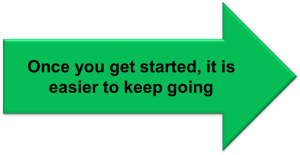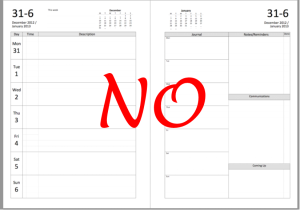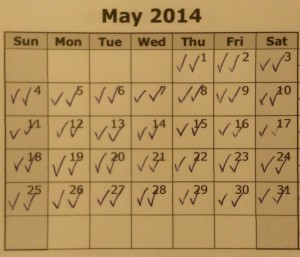Tag: getting stuff done
Time to Get Up!
Is it hard to get out of bed in the morning? Maybe you’re exhausted, you’re depressed, your allergies are acting up, you dread getting up because you hate your job…whatever the reason is a lot of people have a hard time getting out of bed.
There are many ways to force yourself to get up, but if it feels like punishment you’re not being kind to yourself. Booming alarm clocks that startle you awake are effective, but what a crappy way to wake up! Setting the alarm clock across the room might also force you to get up, but then do you hit snooze and get back under the cozy covers and repeat until you’re really tired and really late for work?
As with almost any obstacle, you can find options that encourage and support you instead of bullying yourself. Celebrate small wins. If you wake up tomorrow and feel like you can’t get out of bed, I bet you can sit up and lean against your pillows – that’s a start. Then maybe flip the light on. Then you might try grabbing your smartphone off the nightstand and start answering work emails until your brain is engaged enough to get up.
These or any one of a hundred creative ideas or small steps could be the solution to leaving the comfort of your bed to start your work day.
During the last two weeks I’ve been focused on a big project that required more working hours and energy than is ideal for me. I was extra tired in the morning, but still wanted to get up and get right to work. I needed a boost, but was determined to find a positive solution that felt like I was being helpful to myself – not mean.
This is how my Keurig coffee pot ended up on my nightstand.
I filled the water reservoir before I went to sleep. When my alarm clock went off, I either hit snooze or turned it off. But I also leaned over and turned on the Keurig, put in a coffee pod, and started brewing. Even if I was still lying down, I associate the smell of fresh coffee with getting moving in the morning and my mind started waking up. When the cup was brewed, I had little creamers ready to go. I couldn’t drink my coffee lying down, so I had to sit up. From there, it was much easier to take the cup of coffee into the bathroom and start getting ready for work. If you haven’t had coffee in the shower yet, you’re missing out!
Whatever you experiment with to make your obstacles easier, I hope you do it in a way that is fun and supportive.
Rest well my sleepy friends, and wake with ease and a positive start to your day.
Why I’m Not Planning For The Year Ahead and Using My Three Best Productivity Tips Instead
 Each December and January I receive dozens of emails from productivity experts, and coaches and authors who write books about how to achieve your goals. They each recommend a system for setting goals for the new year ahead.
Each December and January I receive dozens of emails from productivity experts, and coaches and authors who write books about how to achieve your goals. They each recommend a system for setting goals for the new year ahead.
Last year I sifted through these choices and decided to use a comprehensive Word document planner. As I wrote my answers to the questions provided, I listed the focus areas of my life, my values, what I care about, how I want to feel and the skills I enjoy using. Then I made a table in my word document and listed my goals in the first column. Then I matched each of the other areas that I’d identified (values, what I care about, etc) with that particular goal.
Then I identified how I use each hour of the day vs. how I want to use each hour of the day, how I will work towards achieving my goals in each month of the year, and on and on. The entire document was eight pages. I was very serious about it, and it took me three days to complete it.
 And then I never looked at it again until I opened the file to start writing this blog post.
And then I never looked at it again until I opened the file to start writing this blog post.
Almost immediately after I completed the planning document, I regretted that I wasted three days planning out my year instead of getting to work on the projects that I already know are most important to me. I didn’t need to list them on paper.
As I look back at the year that has past, that planning document didn’t help me at all.
Most of my goals turned out just fine. I launched my consulting company and am happy with the results of my first year in business. I took care of my health and my relationships. I launched my blog.
However my biggest goal was also my greatest challenge throughout the year: editing my book and preparing it for publication. The challenges are that it takes intense focus, a block of time to get my head into the work, energy and alertness, and what is often the toughest part: making my way to my office chair to open the document and get to work. Although I worked on it throughout the year, I’m frustrated that I still don’t have an agent-ready manuscript.
This year I am not filling out any annual planning worksheets or setting goals beyond using the best techniques that helped me move my book forward.
In order of the success I had with them, my tips for achieving goals are:
- Creating the smallest habit possible and then committing to repeating it every single day no matter what. For me, this was opening my word document and editing one sentence every day. Making the commitment was enough, but I sometimes used “The Chain Habit”, where you mark on a calendar each day that you complete your goal.
- Allowing other people to push you forward. This isn’t always pleasant. It can feel a little like bullying. But nudges from other people got me to reach out to the one editor that I wanted to work with. She accepted my project and I was thrilled with her edits and suggestions.
- Using self-talk to motivate yourself. Most of us learned in science class that a body in motion is likely to stay in motion and a body at rest is likely to stay at rest. So when I feel inertia, I tell myself that I just have to get started by opening my word doc. Once I get started, everything will be easier.
Whether you enjoy creating detailed plans for the year ahead or reject the whole concept, I wish you the best of luck in achieving your goals this year.
Clearing Your Mailbox Reveals Where You’re Stuck
Yesterday was one of those hectic days when I juggled meetings, appointments and phone calls while my most important task didn’t get addressed until evening. I owed a new client a document that I was excited to work on. I could have approached the project many different ways, and all day long it was in the back of my mind.
Yet when I finally finished my meetings and had time to focus on the document, I did something else first: I cleaned out my mailbox.
I didn’t just deploy the Clean Up feature – I spent an hour overhauling Outlook. I already had a good folder system in place, but was bogged down by hundreds of old mails. By the time I finished, I’d deleted over 600 mails, archived folders that I didn’t want to see anymore, and realized that cleaning out a mailbox can reveal a lot.
Emails that you want to keep but haven’t filed reveal the topics that don’t fit neatly into the rest of your life. Email you haven’t responded to shows what you’re avoiding.
Are you ever going to reread those old articles or click again on the links to interesting websites? If not, it is time to let them go. But if those emails are full of tips that you can use, or ideas for your business then it is time to make a new folder for “Tips” or “Business Ideas”.
Cleaning out my mailbox showed me where I was stuck. When I was finished I felt lighter and energized, like I had freed up wasted space in my mind. I believe visual clutter leads to mental clutter whether the clutter is physical or virtual bits of data clogging up your PC.
When I finally started working on my client’s document, I quickly decided how to approach it and the project flowed smoothly. This afternoon the client told me I’d exceeded his expectations. That’s one of the best compliments I can hope for as a consultant.
I’m going to remember this the next time I want to have a clear, focused mind to start a new project. The first step will be to create space for it.
Fear is a Powerful Motivator
Last weekend I went to a monthly creativity group meeting that I’ve belonged to for about a year. We do fun little art and writing projects that stimulate creative thinking and help get past blocks.
At this meeting, the facilitator gave us a piece of paper with a quote from Jill Badonsky on it. Part of it read, “Many of us think we need to push and pressure ourselves in order to reach goals, and we ruthlessly call ourselves names without much regard to what this is doing to that little spirit inside of us that’s in charge of much of our creativity.”
I don’t call myself names, but when it comes to working on my manuscript I think I do need to pressure myself. I’ve written before about how much I struggle to make progress on my book. For my entire life I’ve been driven to achieve every goal I’ve set, and just plugged away at it until I was done. Until I started writing a book. And it drives me nuts.
At first I established a goal of writing every day, but I ended up with more poetry than book content. I made more progress when I decided to write at least one book sentence each day. Then I used Nanowrimo to push to 50,000 words. And finally I set and achieved the goal of finishing my first draft by the end of 2013.
Since then, I’ve been struggling with my rewrites. I love editing other people’s work, but when it comes to my own, it is so damn hard.
I don’t hate it. It’s more like being afraid of it.
Writing first thing in the morning helps. Eating well and exercising helps. The momentum from the chain habit worked very well for about 100 pages, but after I got sick and broke it, it was easy for me to break it again when I went on vacation last week. And since I’ve been home, I haven’t gotten back into a routine yet.
Part of the challenge is that my revisions take a different type of energy and brainpower than I’m used to using. I have to get my head into my topic without distraction and stay there, laser focused, until I have an idea of what needs to change. The changes might be moving paragraphs from one place to another, filling out a skimpy section, or trying to write a smooth transition sentence. Sometimes I stare at what I’ve written and I know it doesn’t work. It doesn’t work at all. But I don’t know how to fix it.
My most useful tactic in the past for achieving my goals was simple: I just kept working on it until I was finished. No obstacle was insurmountable. But with my book, I can stare at a page and not know what to do. This can go on for days.
Then I go to my two-sided writing hell, where on one fiery wall of doom are the parts of my book that I don’t know how to fix and on the other is a flaming mass of pressure to just finish the damn thing.
Last night I finally had enough of carrying around the feeling of fear in my chest and decided that today would be better. I got up and started writing this post. I still have to work on my book, an article and some consulting work, but I am determined to channel that tension into productivity.
I would much rather be propelled by positive energy, but I’m not alone. Lots of people are motivated by fear. On Tuesday night I listed to a TED Radio Hour show about Diana Nyad, who at age 64 swam 110 miles from Cuba to Florida. It took her 53 hours and was her fifth attempt.
On top of being cold and exhausting, there were sharks and poisonous jelly fish. But Guy Ross, who was interviewing her, noted, “It seems like you were more scared of not making it.”
Nyad answered, “Bingo…I think the fear of failure is a stronger motivator than any other fear.”
Then I read an article about Robert Kirkman, the writer of The Walking Dead comics. He said he sets an unrealistic goal each day, like writing 12 pages, and then when he is only able to complete half of that he has a “crushing sense of failure”. Then the next day he works harder to make up for missing the deadline.
So that’s where I’m at today. Working harder to make up for the progress that I didn’t make over the last ten days. And feeling surprisingly unafraid.
I Broke the Chain and Lived to Tell About It
I broke the chain! The chain habit, that is. I didn’t do my daily goal of one blog sentence, one book sentence on June 30th or July 1st. And there was no earthquake, as I feared would happen if I broke the chain, although it was ungodly hot in Seattle on the 1st day of July. Not my fault! I don’t think….
I fully expected to repeat the chain until my book was finally finished or I died, whichever came first. But I got the stomach flu in the early hours of June 30th, and that was it.
I’m not even upset about it. I started recovering and picked up where I left off. Better, perhaps, because I got a lot more writing done today than I did any other day in June.
It was a tough month. I hurt my wrist from overusing a standard mouse and keyboard instead of my ergonomic ones. Then when I tried to limit my wrist movements when using my computer, I activated an old carpal tunnel injury.
That meant weekly trips to the physical therapist and acupuncturist and as little time on my PC as possible. It also meant that my regular yoga practice was disrupted since I couldn’t put weight on my wrist. I went to a few classes but ended up doing more watch-asanas than practicing and stopped going. So I wasn’t exercising like I usually do, and that made me feel sluggish.
Then my poor cat got sick and lost 15% of his already tiny body weight. At first I thought it was stress because we’ve had a lot of upheaval on the home front lately, but the vet diagnosed hyperthyroidism.
Add to that planning a two and a half week trip to Italy, finishing my biggest consulting project and bidding on a series of new ones, and it was a long, challenging month.
Through all of that, I still accomplished my daily chain goals. Even on my worst day, when I was exhausted and everything seemed to go wrong, I completed two sentences before I went to bed.
On many days in June, two sentences were all I did. So even though I kept the chain going, I wasn’t making much progress. I comforted myself with the thought that some forward movement was better than none.
And then the flu.
My relentless determination met its match and in a way, I’m glad I broke the chain. I was getting by on the minimum and now I’ve had to reset and start over fresh.
So my little calendar has two days with no checkmarks. That’s ok. I’m back on my feet and neither Milo nor I have vomited in four days. Italy hotels are booked. My right arm is strapped with arm and wrist braces that make me look like a futuristic gladiator, but I can type without wincing. And maybe even yoga tomorrow.
Making Progress
 I recently completed my first month of the Chain Habit. It was so easy that I wish I started a long time ago. It’s as simple as making a commitment to take a specific action every day, no matter what. My commitments are “one book sentence, one blog sentence.” Small and achievable.
I recently completed my first month of the Chain Habit. It was so easy that I wish I started a long time ago. It’s as simple as making a commitment to take a specific action every day, no matter what. My commitments are “one book sentence, one blog sentence.” Small and achievable.
Admittedly, some days are easier than others. My best days are when I get out of bed around 6AM and get right to work on revising my manuscript or writing a blog post. Other days, like yesterday, I feel such resistance that I didn’t open my word document until late in the evening. I’m working on a chapter about being financially prepared before quitting a job, and the individual topics aren’t flowing together easily. All day instead of working on this chapter, I imagined myself staring at the pages, not knowing how to fix them. It was overwhelming.
That reluctance carried over into everything on my to-do list. I felt immobilized all day, unsure of which project or task to work on from one moment to the next. I didn’t feel like doing anything, yet was propelled by anxiety to do something. Finally, at 9:30PM last night, I opened my word document and worked on my manuscript. I deleted some sentences, moved paragraphs around, and created a completely new worksheet to help people estimate their current and future expenses. Progress.
Revising my manuscript isn’t the hardest thing I’ve done – not even close. I like the process of editing. In fact I recently revised two bulky process documents as part of my consulting work, and enjoyed doing it.
You know what the hard part of reworking my book is? Sitting in my chair, opening my word document and doing it. Finding the inner motivation is the hard work.
As I mentioned, it’s easier when I get started first thing in the morning. It also helps when I take a piece of notepaper and write down what I want to accomplish the night before. And receiving a compliment about my writing is often enough to make me stop whatever else I’m doing and start working on my book or a blog post. Is that a character flaw that external praise makes me get to work? I don’t care if it gets one more page out of me.
As an aside, I took Samuel Delaney’s workshop at the Summer Writing Program last summer. His perspective was that criticism is a better motivator than praise. His reasoning? After one of his books got outstanding reviews, he did nothing but walk around smiling for three days. And then he read a harsh review that was so unsettling to him that he immediately went to his desk and got to work again. He’s one of the most prolific authors I’ve ever heard of, so clearly that worked for him. I’m going to stick to the positive reinforcement.
As another aside, it was in Delaney’s workshop that I started writing my book.
Another character flaw is that it motivates me when I read something that I don’t like from an author who has sold a lot of books or who has great endorsements. It makes me think that my own book doesn’t have to be a masterpiece; it just needs to be published. And then I get back to work.
It took me thirteen hours before I did any writing and editing yesterday. And I suffered needlessly all day while I put it off. But I finally revised a few pages, and worked on a blog post and now I get to make two check marks on the calendar propped up next to my desk. Whatever works.




Recent Comments